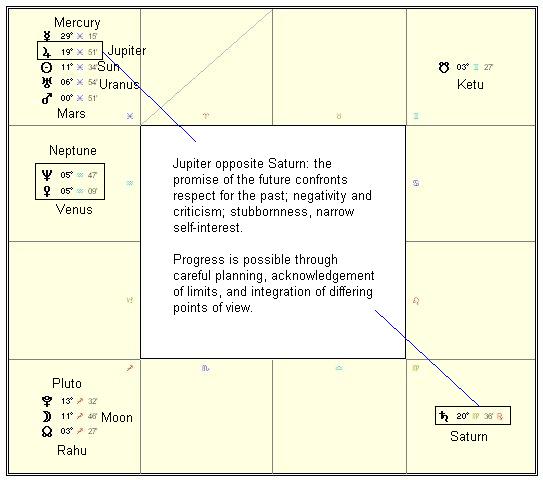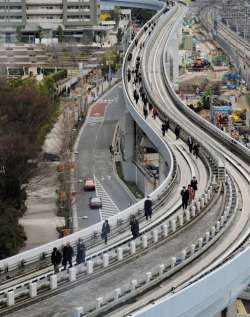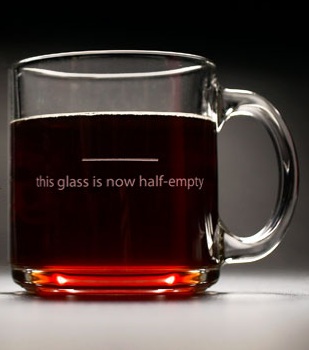
Week of March 21st
Jupiter opposite Saturn: confrontation between old and new
The world is a dangerous place these days. So much is happening now and most of it is bad. Japan, Libya, the Middle East in general. It’s enough to make you look up at the sky and wonder: what the heck is going on up there? The short answer is: a lot.

Week of March 21st
Jupiter opposite Saturn: confrontation between old and new
The world is a dangerous place these days. So much is happening now and most of it is bad. Japan, Libya, the Middle East in general. It’s enough to make you look up at the sky and wonder: what the heck is going on up there? The short answer is: a lot.
 Some of the recent turmoil can be traced back to the December-January eclipse period and the configuration of planets at the turn of the New Year. All three horoscopes featured a fairly high level of affliction that continues to manifest in the recent events in Japan. These single-snapshot charts can influence events for many weeks and months afterwards through the transits of planets that activate sensitive points in the chart. For example, the December 21st lunar eclipse occurred at 5 degrees of sidereal Gemini. The Sun and Moon were in close proximity with the destructive planets Mars (violence, courage, accidents) and Pluto (coercion, power, purging) at the time of the eclipse so this increased the likelihood that some violent events would occur in the period following the eclipse. Just when this potential would be released is seen through transits. At the time of Japan’s earthquake on March 11, Uranus, the planet of sudden or shocking events, had moved into a near-exact square angle with this eclipse point at 6 degrees of Pisces. Uranus may have therefore acted as a trigger that released some of the destructive energy contained in the eclipse.
Some of the recent turmoil can be traced back to the December-January eclipse period and the configuration of planets at the turn of the New Year. All three horoscopes featured a fairly high level of affliction that continues to manifest in the recent events in Japan. These single-snapshot charts can influence events for many weeks and months afterwards through the transits of planets that activate sensitive points in the chart. For example, the December 21st lunar eclipse occurred at 5 degrees of sidereal Gemini. The Sun and Moon were in close proximity with the destructive planets Mars (violence, courage, accidents) and Pluto (coercion, power, purging) at the time of the eclipse so this increased the likelihood that some violent events would occur in the period following the eclipse. Just when this potential would be released is seen through transits. At the time of Japan’s earthquake on March 11, Uranus, the planet of sudden or shocking events, had moved into a near-exact square angle with this eclipse point at 6 degrees of Pisces. Uranus may have therefore acted as a trigger that released some of the destructive energy contained in the eclipse.
I have also discussed how the square aspect between Rahu and Uranus through February and March has disrupted the status quo and fueled the desire for change through the Middle East. The eclipses were probably also implicated in this revolutionary wave, as the conjunction of Jupiter (optimism, hope, expansion) and Uranus (change, independence, revolt) occurred on January 4 — the same day as the solar eclipse. Revolutions typically need to blend positive notions hope and the promise of a better future with a negative stance towards the status quo that confronts and challenges established authority. In this way, both the positive and negative attributes of these eclipses may have been manifested in the historic movements in the Middle East.
This revolutionary movement seems to have entered a new phase this weekend as a US-led coaltion have imposed a no-fly zone over Libya. This essentially amounts to a declaration of war against Gaddafi as the West has realized they had to intervene or else the Libyan rebels would lose. So that early sense of injustice and idealism is being replaced by an old-fashioned battle that relies on force. Part of the explanation may be the gradual separation of the Rahu-Uranus square. As both planets are now separating, that base level desire for change as weakening. More importantly, perhaps is the approaching opposition between Jupiter and Saturn.
 As the two giants of the solar system, Jupiter and Saturn are enormously powerful planets and move quite slowly. This gives them a capacity to shape the trends in human affairs in ways that other planets cannot. Jupiter and Saturn are like a matching pair of opposites not unlike the two poles of a battery — positive and negative. Jupiter represents optimism, expansion/birth and wisdom while Saturn symbolizes pessimism, contraction/loss, and distortion/deception. Of course, Jupiter isn’t all good and Saturn isn’t all bad, but their intrinsic meanings are usually laid out in this plus/minus schematic way.
As the two giants of the solar system, Jupiter and Saturn are enormously powerful planets and move quite slowly. This gives them a capacity to shape the trends in human affairs in ways that other planets cannot. Jupiter and Saturn are like a matching pair of opposites not unlike the two poles of a battery — positive and negative. Jupiter represents optimism, expansion/birth and wisdom while Saturn symbolizes pessimism, contraction/loss, and distortion/deception. Of course, Jupiter isn’t all good and Saturn isn’t all bad, but their intrinsic meanings are usually laid out in this plus/minus schematic way.
When these opposites confront each other in the sky as they do this week, their fundamental incompatibility comes to the surface. Jupiter’s penchant for wise counsel and focus on the future is countered by Saturn’s negativity, stubbornness and resistance to change. Jupiter seeks self-development through an application of intelligence while Saturn prefers to keep things as they are and respect the past and its traditions. Needless to say, getting things done is such an environment can be challenging. That may be one reason why the West has chosen to go to war with Gaddafi. The two sides can’t find a way to resolve their differences any other way than through violence.
Even though international affairs may be visiting the uglier sides of this Jupiter-Saturn opposition, there are still constructive ways to apply this energy in our own lives. The key for making progress this week may be to defer to Saturn first and then take it from there. While both planets are powerful, Saturn is often a stronger influence due to its slower velocity. If Saturn is going to be the more powerful player in the days ahead, it makes sense to acknowledge its symbolic energy first by incorporating some of its positive contributions. So if Saturn rules tradition, order, rules, and responsibilities, we may be better off taking these into account before we decide to plunge ahead with any new Jupiterian plans. This is almost common sense anyway, since the most reliable way forward usually takes current ways of doing things into account. But Saturn can sometimes be intransigent in its views, so we may have to bend over backwards to accommodate its demands. In other words, a well-organized plan that properly integrates established practices may count for a lot here, as Saturn generally doesn’t respond well to hasty or improvised back-of-an-envelope ideas. New ideas will have to be laid out in careful detail if they are to succeed.
 There is also a risk that we can become overly pessimistic or fall prey to biased views during this transit. Saturn can distort our thinking to the point where we only focus on what is wrong with something. Criticism has its place, but we may have to redouble our efforts to ensure that the criticism is appropriate and is not rooted in narrow or self-interested thinking. Saturn can have a selfish influence, and when it exercises too much control it can make us believe that our unique subjective experiences are actually an objective reality shared by everyone. As we know, this is just not true. Everyone has their own opinions and they usually have good reasons for them. The best corrective to this kind of tunnel thinking is to canvas others and see how they are making sense of the situation. It’s only when we lose sight of the whole that we succumb to these kinds of narrow Saturnian errors in judgment.
There is also a risk that we can become overly pessimistic or fall prey to biased views during this transit. Saturn can distort our thinking to the point where we only focus on what is wrong with something. Criticism has its place, but we may have to redouble our efforts to ensure that the criticism is appropriate and is not rooted in narrow or self-interested thinking. Saturn can have a selfish influence, and when it exercises too much control it can make us believe that our unique subjective experiences are actually an objective reality shared by everyone. As we know, this is just not true. Everyone has their own opinions and they usually have good reasons for them. The best corrective to this kind of tunnel thinking is to canvas others and see how they are making sense of the situation. It’s only when we lose sight of the whole that we succumb to these kinds of narrow Saturnian errors in judgment.
I’ve recently added a new write-up on the radiation leak at Japan’s nuclear power plant so you might want to check that out. While the situation seems to be improving in recent days, I’m still concerned that some upcoming Mars transits may correspond with setbacks. Some of the original afflicting planets have moved off a bit, but the charts still look troubled. I’ll feel a lot better about the current planetary set-up once we get past the Mars-Saturn opposition on April 18-19. Whenever these two malefic planets come together, it’s usually a high-stress situation. Let’s hope it manifests simply as the hard work and endurance that the Japanese people will need to clean-up and rebuild their country. Despite the frightening nature of what has been going on there, I have been inspired by their resolute calm and patience in the face of this crisis. There may well be more inspirational energy available this week as Venus (beauty, social bonds) conjoins Neptune (imagination, ideals) on the 26th. Amidst the tumult and unforgiving nature of this harsh new reality, there may be a place for unifying vision of art and love after all.
Have a great week,
Chris

